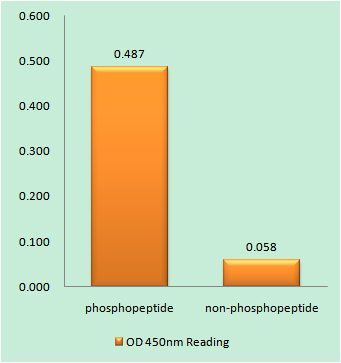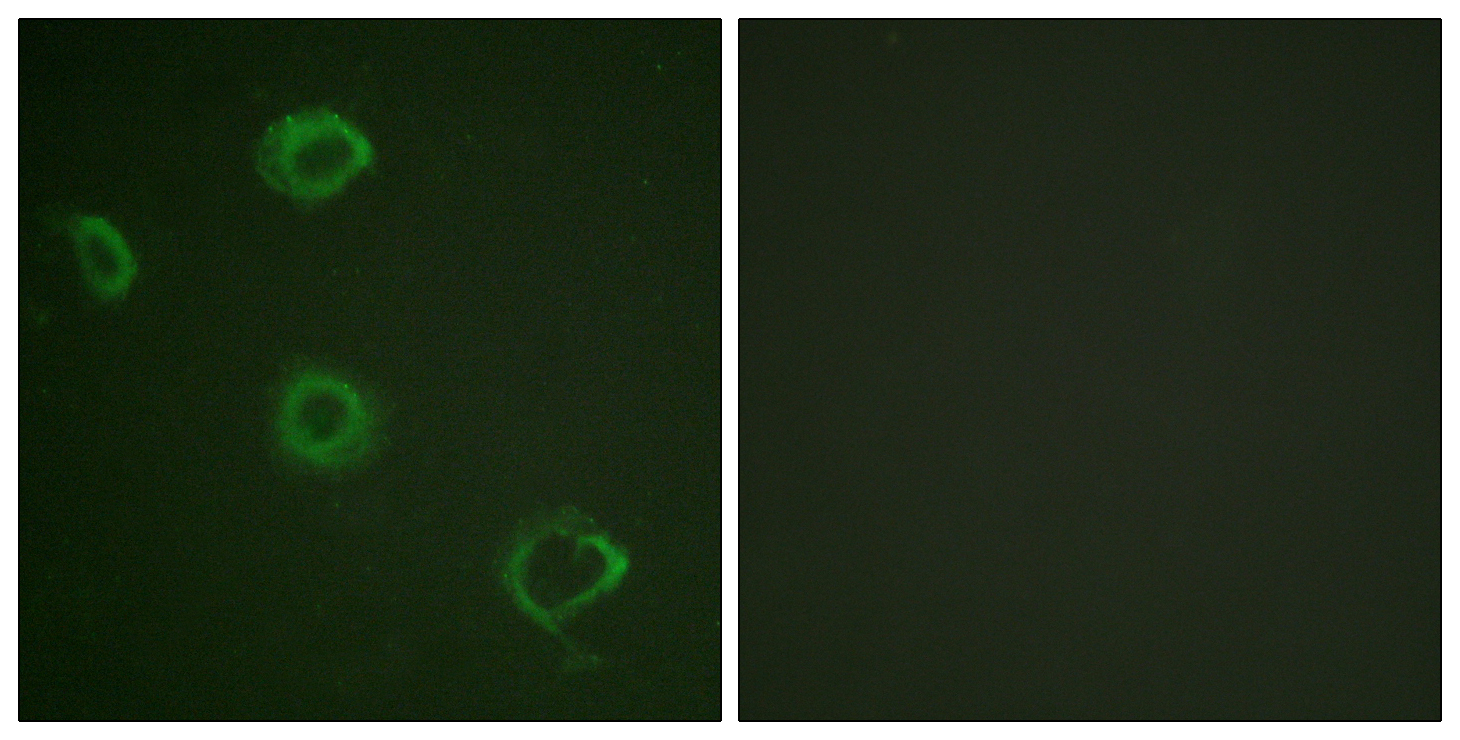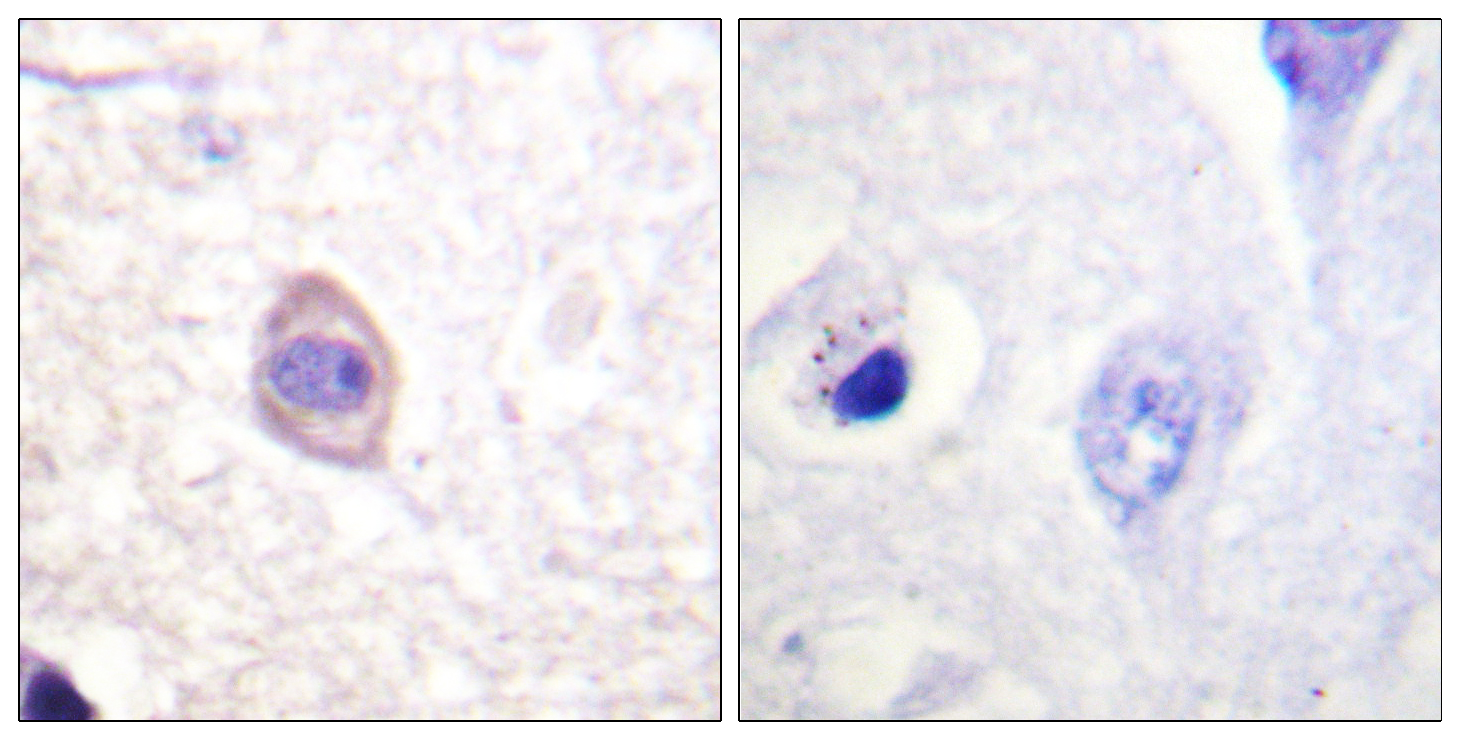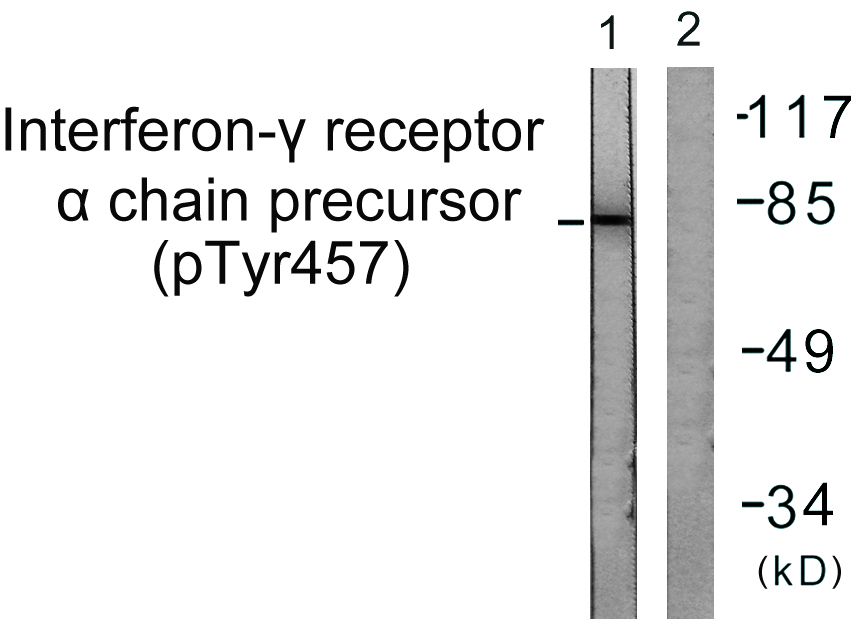IFN-γRα (phospho Tyr457) Polyclonal Antibody
- 货号:YP0926
- 应用:WB;IHC;IF;ELISA
- 种属:Human;Mouse;Rat;Monkey
- 靶点:
- IFN-γRα
- 简介:
- >>Cytokine-cytokine receptor interaction;>>HIF-1 signaling pathway;>>Necroptosis;>>Osteoclast differentiation;>>JAK-STAT signaling pathway;>>Natural killer cell mediated cytotoxicity;>>Th1 and Th2 cell differentiation;>>Th17 cell differentiation;>>Leishmaniasis;>>Chagas disease;>>Toxoplasmosis;>>Tuberculosis;>>Influenza A;>>Kaposi sarcoma-associated herpesvirus infection;>>Herpes simplex virus 1 infection;>>Pathways in cancer;>>PD-L1 expression and PD-1 checkpoint pathway in cancer;>>Inflammatory bowel disease
- 基因名称:
- IFNGR1
- 蛋白名称:
- Interferon gamma receptor 1
- Human Gene Id:
- 3459
- Human Swiss Prot No:
- P15260
- Mouse Gene Id:
- 15979
- Mouse Swiss Prot No:
- P15261
- 免疫原:
- The antiserum was produced against synthesized peptide derived from human Interferon-gamma Receptor alpha around the phosphorylation site of Tyr457. AA range:431-480
- 特异性:
- Phospho-IFN-γRα (Y457) Polyclonal Antibody detects endogenous levels of IFN-γRα protein only when phosphorylated at Y457.
- 组成:
- Liquid in PBS containing 50% glycerol, 0.5% BSA and 0.02% sodium azide.
- 来源:
- Polyclonal, Rabbit,IgG
- 稀释:
- WB 1:500 - 1:2000. IHC 1:100 - 1:300. IF 1:200 - 1:1000. ELISA: 1:20000. Not yet tested in other applications.
- 纯化工艺:
- The antibody was affinity-purified from rabbit antiserum by affinity-chromatography using epitope-specific immunogen.
- 浓度:
- 1 mg/ml
- 储存:
- -15°C to -25°C/1 year(Do not lower than -25°C)
- 其他名称:
- IFNGR1;Interferon gamma receptor 1;IFN-gamma receptor 1;IFN-gamma-R1;CDw119;CD antigen CD119
- 实测条带:
- 83kD
- 背景:
- This gene (IFNGR1) encodes the ligand-binding chain (alpha) of the gamma interferon receptor. Human interferon-gamma receptor is a heterodimer of IFNGR1 and IFNGR2. A genetic variation in IFNGR1 is associated with susceptibility to Helicobacter pylori infection. In addition, defects in IFNGR1 are a cause of mendelian susceptibility to mycobacterial disease, also known as familial disseminated atypical mycobacterial infection. [provided by RefSeq, Jul 2008],
- 功能:
- disease:Defects in IFNGR1 are a cause of mendelian susceptibility to mycobacterial disease (MSMD) [MIM:209950]; also known as familial disseminated atypical mycobacterial infection. This rare condition confers predisposition to illness caused by moderately virulent mycobacterial species, such as Bacillus Calmette-Guerin (BCG) vaccine and environmental non-tuberculous mycobacteria, and by the more virulent Mycobacterium tuberculosis. Other microorganisms rarely cause severe clinical disease in individuals with susceptibility to mycobacterial infections, with the exception of Salmonella which infects less than 50% of these individuals. The pathogenic mechanism underlying MSMD is the impairment of interferon-gamma mediated immunity whose severity determines the clinical outcome. Some patients die of overwhelming mycobacterial disease with lepromatous-like lesions in early childhood, whereas
- 细胞定位:
- Cell membrane ; Single-pass type I membrane protein .
- 组织表达:
- Blood,Liver,Prostate,
- June 19-2018
- WESTERN IMMUNOBLOTTING PROTOCOL
- June 19-2018
- IMMUNOHISTOCHEMISTRY-PARAFFIN PROTOCOL
- June 19-2018
- IMMUNOFLUORESCENCE PROTOCOL
- September 08-2020
- FLOW-CYTOMEYRT-PROTOCOL
- May 20-2022
- Cell-Based ELISA│解您多样本WB检测之困扰
- July 13-2018
- CELL-BASED-ELISA-PROTOCOL-FOR-ACETYL-PROTEIN
- July 13-2018
- CELL-BASED-ELISA-PROTOCOL-FOR-PHOSPHO-PROTEIN
- July 13-2018
- Antibody-FAQs
- 产品图片

- Enzyme-Linked Immunosorbent Assay (Phospho-ELISA) for Immunogen Phosphopeptide (Phospho-left) and Non-Phosphopeptide (Phospho-right), using Interferon-gamma Receptor alpha (Phospho-Tyr457) Antibody

- Immunofluorescence analysis of A549 cells, using Interferon-gamma Receptor alpha (Phospho-Tyr457) Antibody. The picture on the right is blocked with the phospho peptide.

- Immunohistochemistry analysis of paraffin-embedded human brain, using Interferon-gamma Receptor alpha (Phospho-Tyr457) Antibody. The picture on the right is blocked with the phospho peptide.

- Western blot analysis of lysates from COS7 cells, using Interferon-gamma Receptor alpha (Phospho-Tyr457) Antibody. The lane on the right is blocked with the phospho peptide.



